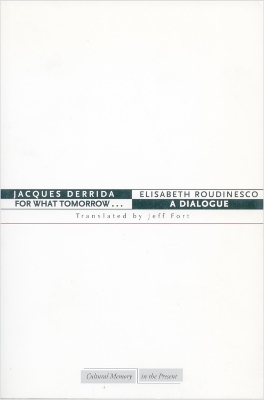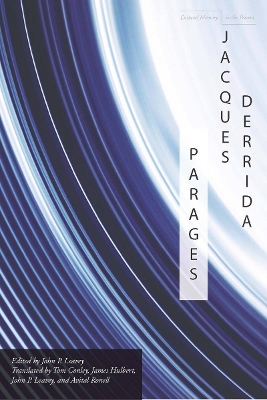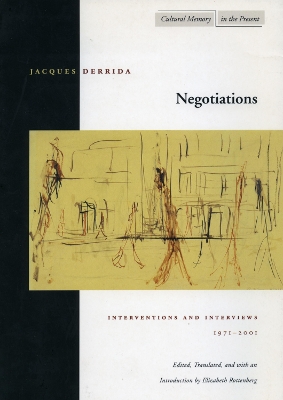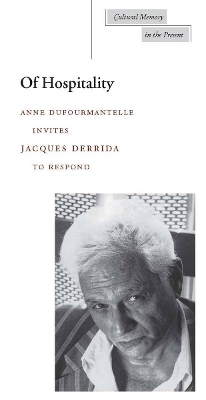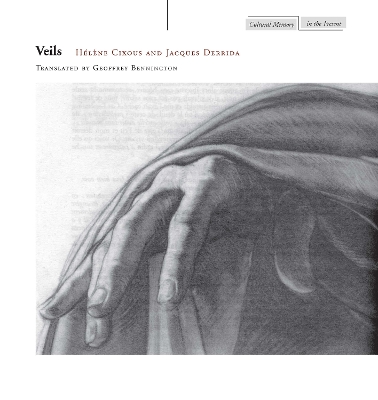Cultural Memory in the Present
6 total works
“For what tomorrow will be, no one knows,” writes Victor Hugo.
This dialogue, proposed to Jacques Derrida by the historian Elisabeth Roudinesco, brings together two longtime friends who share a common history and an intellectual heritage. While their perspectives are often different, they have many common reference points: psychoanalysis, above all, but also the authors and works that have come to be known outside France as “post-structuralist.”
Beginning with a revealing glance back at the French intellectual scene over the past forty years, Derrida and Roudinesco go on to address a number of major social and political issues. Their extraordinarily wide-ranging discussion covers topics such as immigration, hospitality, gender equality, and “political correctness”; the disordering of the traditional family, same-sex unions, and reproductive technologies; the freedom of the “subject” over and against “scientism”; violence against animals; the haunting specter of communism and revolution; the present and future of anti-Semitism (as well as that which marked Derrida’s own history) and the hazardous politics of criticizing the state of Israel; the principled abolition of the death penalty; and, to conclude, a chapter “in praise of psychoanalysis.”
These exchanges not only help to situate Derrida's thought within the milieu out of which it grew, they also show more clearly than ever how this thought, impelled by a deep concern for justice, can be brought to bear on the social and political issues of our day. What emerges here above all, far from an abstract, apolitical discourse, is a call to take responsibility—for the inheritance of a past, for the singularities of the present, and for the unforeseeable tasks of the future.
Parages brings together four essays by Derrida on the fictions of Maurice Blanchot. Three of the essays—"Living On," "Title To Be Specified," and "The Law of Genre," are by now canonical. The fourth, "Pace Not(s)" as well as Derrida's 1986 introduction to the French edition of the book, appear here in English for the first time. This was a breakthrough publication in the analysis of Blanchot, a notoriously difficult writer. It is safe to say Derrida contributed much to that writer's reputation in both French and English, always insisting on the philosophical pertinence of Blanchot's work to any discussion of the relationship between literature and critical thought. Through patient citation, and an ample collocation and readings of Blanchot's various motifs, Derrida explores a variety of questions, including the limits of genre, the procedure of crossing out, and the evocation of a non-dialectical and non-privative negativity. The book marks a crucial stage in Derrida's itinerary and provides a context for his later writings on apophatics in such works as On the Name (SUP, 1995) and his response to Heidegger on death in Aporias (SUP, 1993).
This collection of essays and interviews, some previously unpublished and almost all of which appear in English for the first time, encompasses the political and ethical thinking of Jacques Derrida over thirty years. Passionate, rigorous, beautifully argued, wide-ranging, the texts shed an entirely new light on his work and will be welcomed by scholars in many disciplines—politics, philosophy, history, cultural studies, literature, and a range of interdisciplinary programs.
Derrida's arguments vary in their responsiveness to given political questions—sometimes they are vivid polemics on behalf of a position or figure, sometimes they are reflective analyses of a philosophical problem. They are united by the recurrent question of political decision or responsibility and the insistence that the apparent simplicity or programmatic character of political decision is in fact a profound avoidance of the political. This volume testifies to the possibility and the necessity of a philosophical politics.
Negotiations assembles some of the most telling examples of the intrinsic relationship, so often affirmed by Derrida in more abstract philosophical terms, between deconstructive reading practices and what is called the "political"—more precisely, politics in an almost down-to-earth, pragmatic, and commonsense use of the word. Among the many subjects covered in the book are: the death penalty in the United States, the civil war in Algeria, globalization and cosmopolitanism, the American Declaration of Independence, Jean-Paul Sartre, the value of objectivity, politics and friendship, and the relationship between deconstruction and actuality.
These two lectures by Jacques Derrida, "Foreigner Question" and "Step of Hospitality/No Hospitality," derive from a series of seminars on "hospitality" conducted by Derrida in Paris, January 1996. His seminars, in France and in America, have become something of an institution over the years, the place where he presents the ongoing evolution of his thought in a remarkable combination of thoroughly mapped-out positions, sketches of new material, and exchanges with students and interlocutors.
As has become a pattern in Derrida's recent work, the form of this presentation is a self-conscious enactment of its content. The book consists of two texts on facing pages. "Invitation" by Anne Dufourmantelle appears on the left (an invitation that of course originates in a response), clarifying and inflecting Derrida's "response" on the right. The interaction between them not only enacts the "hospitality" under discussion, but preserves something of the rhythms of teaching.
The volume also characteristically combines careful readings of canonical texts and philosophical topics with attention to the most salient events in the contemporary world, using "hospitality" as a means of rethinking a range of political and ethical situations. "Hospitality" is viewed as a question of what arrives at the borders, in the initial surprise of contact with an other, a stranger, a foreigner. For example, Antigone is revisited in light of the question of impossible mourning; Oedipus at Colonus is read via concerns that also apply to teletechnology; the trial of Socrates is brought into conjunction with the televised funeral of François Mitterrand.
Something of a historical event, this book combines loosely "autobiographical" texts by two of the most influential French intellectuals of our time. "Savoir," by Helene Cixous, is a brief but densely layered account of her experience of recovered sight after a lifetime of severe myopia, an experience that ends with the unexpected turn of grieving for what is lost. Her literary inventiveness mines the coincidence in French between the two verbs savoir (to know) and voir (to see). Jacques Derrida's "A Silkworm of One's Own" complexly muses on a host of autobiographical, philosophical, and religious motifs-including his varied responses to "Savoir." The two texts are accompanied by six beautiful and evocative drawings that play on the theme of drapery over portions of the body.
Veils suspends sexual difference between two homonyms: la voile (sail) and le voile (veil). A whole history of sexual difference is enveloped, sometimes dissimulated here-in the folds of sails and veils and in the turns, journeys, and returns of their metaphors and metonymies.
However foreign to each other they may appear, however autonomous they may be, the two texts participate in a common genre: autobiography, confession, memoirs. The future also enters in: by opening to each other, the two discourses confide what is about to happen, the imminence of an event lacking any common measure with them or with anything else, an operation that restores sight and plunges into mourning the knowledge of the previous night, a "verdict" whose threatening secret remains out of reach by our knowledge.
Writing in a familiar and unguarded manner, as if he were "on vacation" from his own writing, Derrida still remains totally faithful to that work and invites the reader to reflect on much of what haunts his texts as well as his daily life, questions of distance and death, the relation to the other, and exile..
